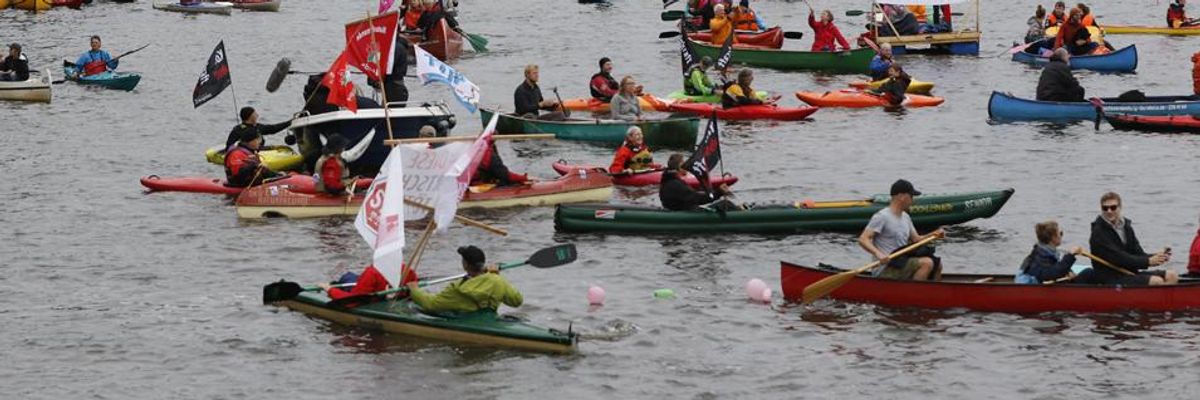Thousands of anti-globalization activists took to the streets and waterways of Hamburg, Germany Sunday ahead of this week's G20 summit.
Police said at least 10,000 demonstrators marched peacefully in the rain in a prelude to the July 7-8 meeting, where 21,000 police with dogs, horses and helicopters from across Germany will attempt to protect the leaders of the world's 20 largest economies. Trump, Erdogan, Putin, Merkel, the Saudis, and over 100,000 protesters are also expected.
Sunday's action was the first of 30 registered demonstrations this week. Many in the crowd carried banners reading: "Fight poverty," "Leave the Oil in the Soil," "Stop coal," and "Planet earth first".
First Postreports:
Summits of world leaders are usually highly choreographed affairs that leave little to chance. They are held in locations that are easily shielded from demonstrators. And policy differences are papered over by envoys behind closed doors well ahead of time. But the G20 meeting in Hamburg next week will be different. Host German Chancellor Angela Merkel has taken a high-risk gamble by choosing to hold the summit in the centre of the northern port city, partly to show the world that big protests are tolerated in a healthy democracy. This has created a huge challenge for police.
Here's the protest schedule in Hamburg this week:
Sunday's demonstration was organized by a group called "Protest Wave G20". Other demonstrations this week are called "Welcome to Hell" and "G20 Not Welcome." "The policies of the G20 have created hellish conditions in many countries around the world," Andreas Blechschmidt, one of the organzers of the 6 July protest, told Reuters in front of the Rote Flora, which stands just a few hundred meters from the site where the leaders will meet.
"We want to show them that we can turn up the heat too," he said.
The NoG20 International coordination issued this statement this week:
"As international campaigners preparing to travel to Hamburg for the demonstrations against the G20 summit in July, we call for the defence of basic civil and political liberties currently being denied: the right to protest, the freedom of assembly, the freedom of movement..."
"The politics of neoliberalism and war is decided in the heart of our cities, closed off to citizens, protected by a militarized police force and backed up by the suspension of political rights. This shutting-down of democracy has one purpose only: to defend the indefensible."
"Our demonstrations speak for and of a different world: One, which is not driven by the logics of racism, misogyny, homophobia and the fear of difference, a world that takes the huge climate changes caused by human action seriously while meeting health, educational and social needs today. We reject a world in which a sports shoe can cross the Mediterranean while people drown. We speak for different cities: Cities, which are not hollowed out by real-estate speculation and the privatization of public services, cities, which are lively and diverse, where people can disagree freely and express their own hopes for a better world, cities like the Hamburg we know and love."

